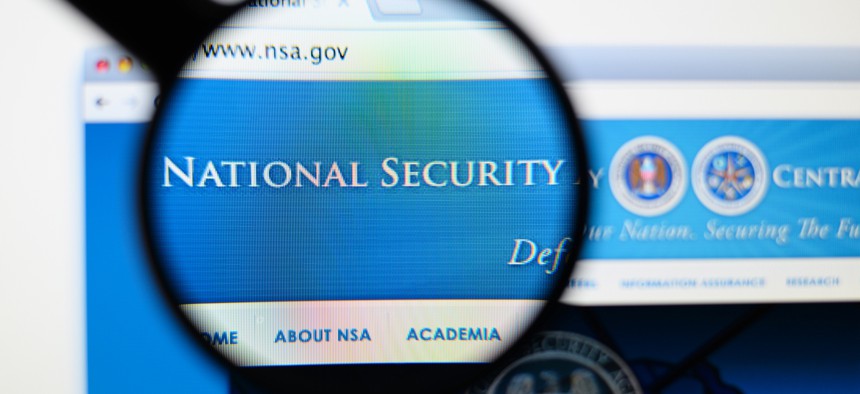
Gil C / Shutterstock.com
Experts: NSA Spying May Leave the U.S. Without Moral High Ground in OPM Hack
Was the breach of federal employee records all that different from U.S. surveillance programs?
All signs point to China being responsible for one of the worst hacks in U.S. history, exposing sensitive records of millions of federal employees.
But the U.S. is an awkward position in deciding how to respond to the humiliating blow. That's partially because in the two years since Edward Snowden's leaks about U.S. surveillance, the Obama administration has repeatedly argued that hacking into computer networks to spy on foreigners is completely acceptable behavior.
It won't be so easy for the U.S. to express indignant outrage just because it's on the opposite side of the surveillance this time.
"Stealing secrets from governments is part of spying," said Adam Segal, who studies cybersecurity and Chinese policy as a senior fellow at the Council on Foreign Relations. "You can get angry with the incompetence of our defense. It's hard to get angry with the Chinese for trying."
China has denied responsibility for the breach of the Office of Personnel Management, and attributing responsibility for cyberattacks is always tricky. It's possible that the hackers could be Chinese criminals hoping to use the Social Security numbers and other federal employee records to commit financial fraud.
But top U.S. officials reportedly believe that the Chinese government is behind the attack, and Senate Democratic Leader Harry Reid, who receives classified intelligence briefings, blamed the country in a speech on the Senate floor last week.
If the attack was the work of Chinese government hackers, they could use the information to build a detailed database of information on U.S. officials at all levels of government. Administration officials say the hackers likely obtained security clearances, which could be used to identify undercover U.S. operatives or blackmail officials.
The U.S. has called out China before for cyberespionage. The Justice Department even indicted five alleged Chinese military hackers last year for stealing secrets from U.S. businesses.
But the U.S. has drawn a bright line between spying for national security and spying to gain an economic edge. It's unacceptable to steal trade secrets, U.S. officials argue, but governments spy on other governments every day.
The Snowden documents, for example, revealed that the NSA had tapped into links between Google and Yahoo data centers overseas to collect records on hundreds of millions of people at will.
"The legal safeguards that restrict surveillance against U.S. persons without a warrant do not apply to foreign persons overseas," President Obama explained in a speech last year. "This is not unique to America; few, if any, spy agencies around the world constrain their activities beyond their own borders. And the whole point of intelligence is to obtain information that is not publicly available."
The OPM breach also appears to be different from North Korea's alleged hack of Sony Pictures last year, which caused unprecedented damage to a U.S. company, experts say.
James Lewis, a senior fellow with the Center for Strategic and International Studies, said that the evidence seems to indicate that the hack of OPM was a standard intelligence-gathering operation.
"This is traditional spying stuff, so it's not unprecedented," he said.
But as the most powerful nation in the world, the U.S. doesn't have to worry about being hypocritical, he argued.
"From a legal perspective, we don't have a leg to stand on, but as a great power, we can say, 'Hey, we're not going to let you get away with this, and we want to see this stop,'" Lewis said.
Earlier this year, Obama signed an executive order allowing the Treasury secretary to impose sanctions on individuals or groups that engage in cyber attacks that threaten U.S. national security. Asked about the executive order in a press briefing on Friday, Josh Earnest, the White House press secretary, said that the "newly available option is one that is on the table."
But imposing economic sanctions would almost certainly prompt another retaliation from China, leading to a spiral of hostile steps that neither country wants, Lewis said.
The U.S. response, Lewis predicted, will more likely be symbolic and behind the scenes. The U.S. might delay a meeting between leaders or not give China the kind of public recognition as a global power that it craves, he said.
Segal said it is unlikely that the U.S. could ramp up its surveillance of China as a response. "I assume we're already spying as much as we can," he said. "I don't know how we can do more."
Both Segal and Lewis predicted that U.S. hackers will try to locate the vast batch of OPM records on Chinese servers, and if possible, delete it.
But for now, the U.S. hasn't even publicly accused China of responsibility for the breach.
On Friday, National Security Advisor Susan Rice met with Chinese General Fan Changlong at the White House to discuss military and disaster relief coordination and "narrowing areas of disagreement, including on maritime and cyber issues," according to a statement from the White House.
(Image via Gil C / Shutterstock.com )







